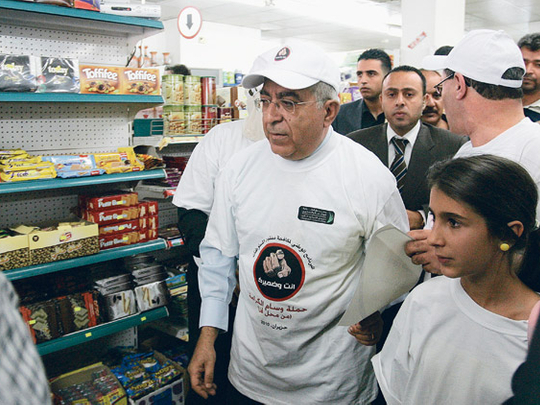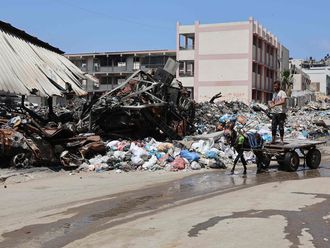
Ramallah: The Palestinian National Authority (PNA) says it is about to devise new ways to tighten the boycott of products manufactured in West Bank colonies.
Essam Al Qasim, who is co-ordinating the nation-wide campaign to boycott colony products, said Palestinians were aware there were many Israeli factories, based in Israel, that ran branches in the colonies.
"Such factories will soon be added to the boycott list and their products will be off the shelves of West Bank outlets," he said.
The PNA said it would also cancel the licences of agents for the products made in the colonies.
Palestinian Prime Minister Dr Salam Fayyad said during his campaign launch that his territories would be free of colony products by year end and that banning such products would be a key factor in creating the independent state of Palestine.
A list of the products made in the colonies and the names of the factories which made them would be released in Europe and other parts of the world in a bid to keep the products off shelves abroad also, he said.
Al Qasim stressed that Palestinians were using all diplomatic avenues to fight colony products.
He said the Palestinians' chances of winning this political war were high.
Al Qasim said that the shop-to-shop campaign would end today and shops "free of colony products and services" would be awarded certificates.
"The ban of such products will be put in place by force," he said.
The promotion of national products to replace the colony products would be another key ingredient in the campaign, he said.
"The products made in the Palestinian territories are of good quality and can compete with the colony products and it is officially considered a national duty to go for these Palestinian products," he said.
He underlined the importance of public cooperation with the campaign, saying that the boycott of colony products was a fundamental way to fight the Israeli occupation in the West Bank.
West Bank agents
However, in response, factories in the colonies had been offering great support to their West Bank agents, he indicated.
Palestinian sources in Ramallah said the colonist business people, in collaboration with some Palestinian traders, had been playing "dirty games" to try to ensure the campaign failed.
They were working to return to the business climate in which West Bank shelves were filled with colony products.
Palestinian traders recently offered the owners of such factories the opportunity to change the labels on their products — a suggestion which the owners of these factories could easily implement to turn the boycott campaign around.
The PNA has also been aware of a plan that was put in place by the owners of factories and lands in the colonies to allow their proxy agents in the West Bank to take over these facilities temporarily.
The sources said that such agreements, when signed, would show the products of the colonies to be only Palestinian products which could circulate in the West Bank markets.
The sources explained that according to the agreement, the colonist owners of the factories and lands would buy all the products of these factories and lands in advance, to be sent directly to Israel.
Here they could later be displayed in the West Bank as products made inside Israel, without any mention of the colonies.
The officials said that PNA departments would take all necessary precautionary measures to ensure those Palestinian traders were not granted the necessary licences to set up suspected companies.
The officials warned that the PNA would be tough with the suspected Palestinian traders who attempted to play underhand games with the colonists to smuggle their products onto Palestinian shelves.
Traders face big fines
A new Palestinian law now imposes prison sentences of up to five years and fines of up to $22,000 (Dh80,000) for trading in colony goods, but the Palestinian National Authority (PNA) has yet to pass a proposed law that would severely punish the Palestinians who work for colonists.
The 3,000 Palestinians, out of a total of 4,000 employees, in Mishor Adumim, outside Occupied Jerusalem, could be forced to quit their jobs if the PNA makes good on its threat to ban colony work.
With 22,000 Palestinians working in Israeli colonies, the ban would have serious repercussions both for the Palestinian economy, where unemployment is high, and for colony businesses, many of which would be forced to shut down.
The presence of nearly half a million Israelis in more than 120 colonies scattered across the West Bank, including Occupied Jerusalem, has long been one of the thorniest issues in the Middle East peace process.
The international community considers all West Bank colonies illegal because they are built on Palestinian territory which Israel captured from Jordan in the 1967 Six-Day War.
While 72 per cent of Palestinians supported the boycott on products, a recent opinion poll showed 60 per cent opposed the ban on colony work.
Colony business leaders insist they contribute to the Palestinian economy, by offering pay well above West Bank levels — though lower than Israeli wages.
— AFP












